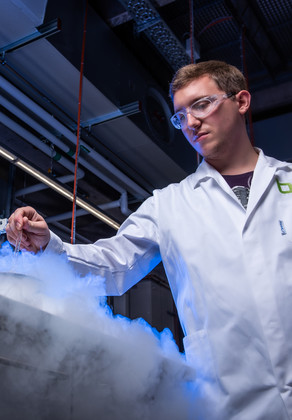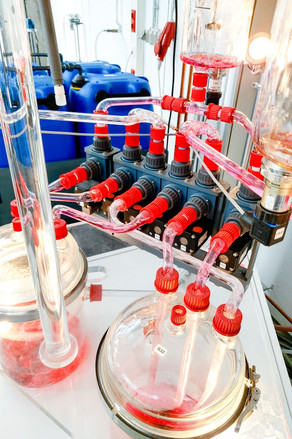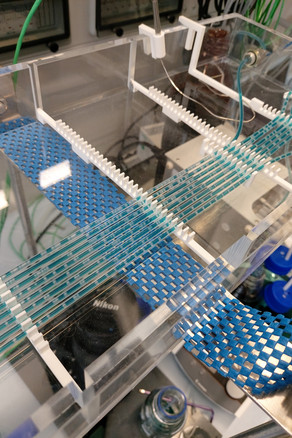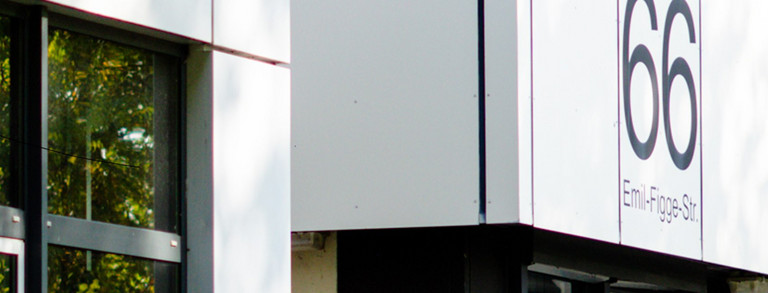Study under difficult conditions
- Archiv 2020
- News
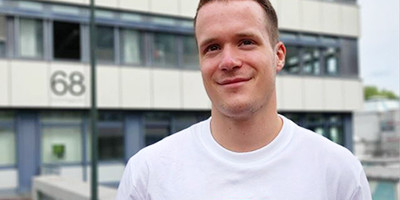
Nils Kaufhold earns a bachelor's degree in chemical engineering despite visual impairment.
It has been the exception rather than the rule for students with a disability to graduate from our engineering faculty. However, Mr. Nils Kaufhold has shown in a convincing way that it can be done differently. He has now obtained a bachelor's degree in chemical engineering (despite a visual impairment). Congratulations!
Mr. Kaufhold started his studies after graduating from high school and a voluntary social year at the BCI faculty (2015). He has now obtained his bachelor's degree with his bachelor thesis "Development of a concept for the control of the operating pressure of an agitated-pulsed extraction" at the Chair of Apparatus Design. We talked to Mr. Kaufhold about his studies under difficult conditions.
BCI 1: First of all, congratulations again on successfully completing your studies despite your visual impairment. How did you find out about the CIW program and why did you choose our faculty?
I became aware of the program and the faculty through a former graduate of the faculty.
2. did you inform yourself about the situation at TU Dortmund University before you started your studies and, if so, where?
I contacted the DoBuS (TU Dortmund University, Center for Higher Education, Disability and Studies Department) before I started my studies. The staff on site support students with a chronic illness or a disability in their studies. Here you can get important tips and advice on studying with an impairment even before you start your studies.
3. What were the biggest challenges during your studies?
Finding my way around campus at the beginning of my studies as well as following lectures. It took me a bit to find the right methods for that for me.
4. Were you able to complete all the practical aspects of your studies without any problems?
I was able to complete the internships at the BCI faculty without any problems. There were only problems with the practical course in inorganic chemistry. But this problem could also be solved.
5. the bachelor's degree program also includes completing an internship in industry. What was your experience like there?
I had a good experience with my industrial internship, where I was able to gain initial insights into which activities would be suitable for me in my professional life and which would not be possible for me.
Where did you receive support during your studies?
I received a lot of support from my fellow students/friends, without whom my studies would have been much more difficult. Furthermore, the DoBuS helped me, as well as the professors' and lecturers' understanding of my impairment.
7. A few months ago, a haptic map of the TU Dortmund University with acoustic support was opened to help students with an impairment find their way around the campus. How do you see the developments in this regard at the TU Dortmund during your time as a student?
I think that the TU is on the right track and is constantly trying to make it easier for students with disabilities to study. A map with acoustic support should make orientation much easier at the beginning of your studies.
8. Where do you see a need for improvement at the BCI faculty for students with disabilities?
I think it would help students especially with impairments if their concerns about completing internships were taken away before they even begin their studies. For students with visual impairments, existing computer programs on the computers in the PC Pools, such as ZoomText, may help.
9. What are your further professional plans?
I am now doing my master's degree at the BCI faculty. Everything else will come up during that time.
10. your message to prospective students with limitations:
If there is an interest in this field, just do it. The problems that arise can always be solved with support or a greater time commitment. Don't be afraid to study with the BCI faculty.
Mr. Kaufhold, we would like to thank you very much for this interview and are sure that you were able to reduce the concerns of prospective students with limitations through your presented experiences.
We wish you all the best for your future career!


